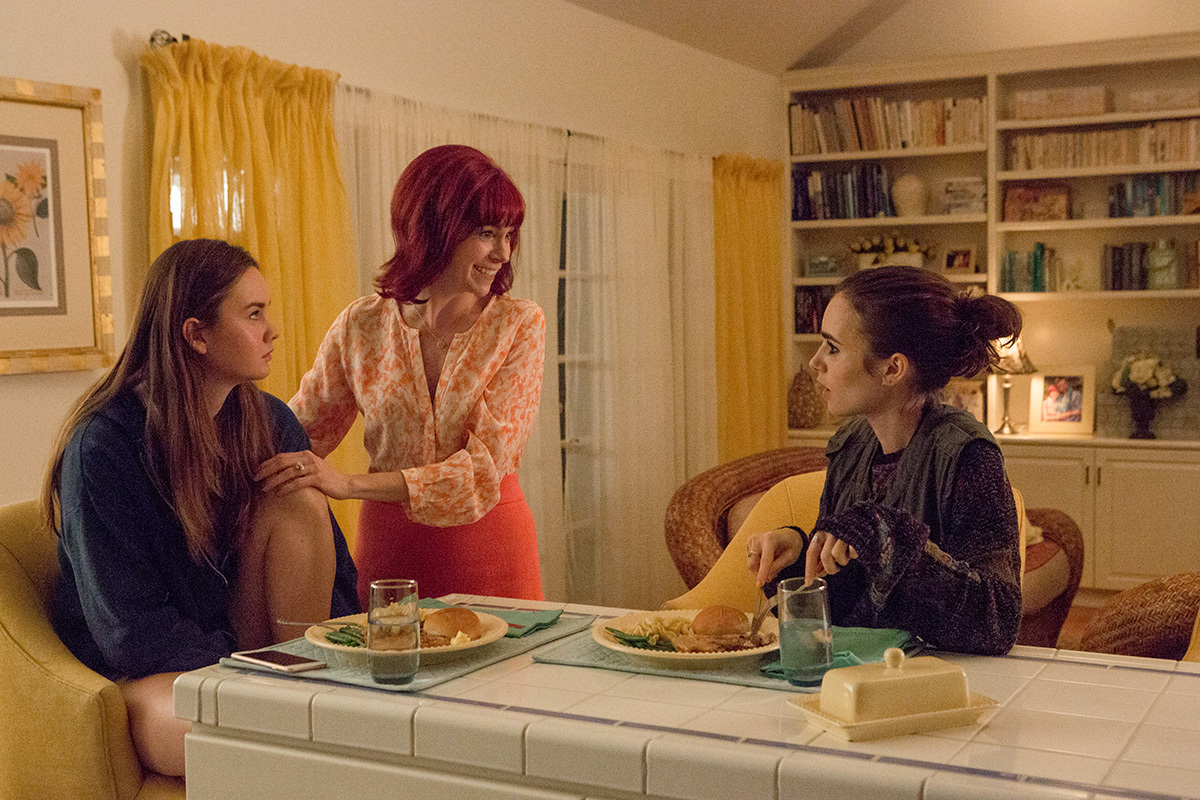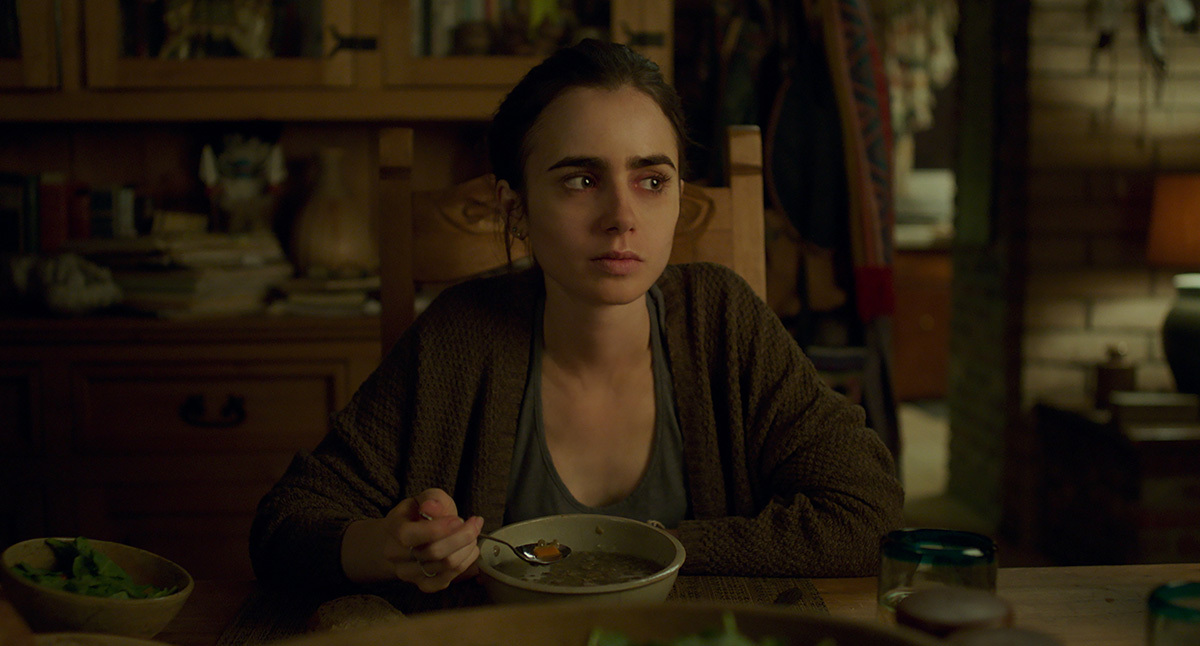This article was originally published by i-D UK.
Following a growing trend for films tackling previously ‘”taboo” topics (think: 13 Reasons Why and suicide, iBoy and rape), the time was ripe for a realistic depiction of eating disorders on screen. All too often the punchline of a joke at the expense of a thin model or insecure teenage girl, the treatment of anorexia and bulimia in film and television has left much to be desired. To the Bone, Netflix’s latest feature film, draws on the experiences of director Marti Nixon and follows 20-year-old Ellen, played by Lily Collins, as she navigates her way through various unsuccessful treatment centers, only to find hope in a group home and untraditional doctor.
Available to stream from today, we spoke to Lily about the importance of having frank discussions about eating disorders, finding a balance between acting and reality, and the body image pressures of being an actress in the spotlight.
What drew you to working on To the Bone?
I’d just written a chapter on my eating disorder in my autobiography the week before, so it was a really interesting timing. I read the script and fell in love with it. It was like a guttural instinct right away.
As you mention, you’ve now publicly spoken out about your own experience of anorexia. When you read the script, did you find there were any parallels between you and your character Ellen?
Yeah, there were a lot of characteristics I could associate with. I had been reading my journal in order to write this chapter of my book, so it was fresh in my mind. It was eerily similar to a lot of things I’d experienced. To do this project with someone who had also gone through these experiences made it the most safe environment to do it.
I could relate to [director Marti Nixon] in a lot of ways, and I felt safe enough to tell her about my own problems; it’s not as if the script changed a lot, but like the nuances to the performances, and she was so open to hearing about my experiences and collaborating. So I tried to put as much of myself in there as possible.
Why now have you decided to speak out about this topic?
I was writing this book and I knew it was going to be all these different subjects that young people find too taboo to talk about, but once they do they realize they’re not alone it can spark really important conversation. One was my history with eating disorders. I figured I’m going to write it now because if not now, when. I didn’t want this disorder to plague my future and I thought if I didn’t talk about it now and feel freer, then when will I?
The preparation for the role will have been quite difficult, and a degree of separation from your experiences must’ve been necessary. How did you get into that frame of my mind without going too far deep in?
I met with an Anorexics Anonymous group, where Marti and I got to speak to young girls in recovery and their therapists. I also met with the head of a clinic for eating disorders in California. He surrounded me with more of the facts on the medical side of it. I worked with a nutritionist to lose the weight, there was never a set number in mind. But I always maintain control over movie and reality. It was nerve-racking, but it was for a grander purpose.
And at no point did it feel too much of an undertaking?
No, because I was so fueled by this passion to tell the story. Not only for Marti, but for myself. I knew the 16-year-old in me would really want that, and I felt really proud to tell it in this way.
On screen depictions of eating disorders are still not commonplace.
No — this is the first ever feature film. However, it’s been done on TV.
I was going to say, the only character that had a realistic eating disorder that sticks in my mind is Cassie from Skins. For many people in their 20s, I’d imagine that was an important character. Did you connect with Cassie at all?
Yeah, I loved Skins. I thought it was such an amazing depiction of youth. It was so relatable, and I think this is another way to reach people. Especially with Netflix picking it up because you can watch it from the privacy of your room. I think it’s something that’ll bring attention to it in a new way.
Like Skins there’s a dark comedy element to the film.
A total dark comedy element to it, which I loved! Marti does that so beautifully in all her projects. Knowing the disorder so well, there is this sick sense of humor that you use to deflect the issues. In life we all need humor to get through the dark times and it’s a little confusing at first when you take subject matter like this and make it funny, but there was a way of making this content entertaining.
And more consumable.
Exactly. You want to learn something from watching it but you don’t want it to be a tutorial.
As a young actor, what stories do you feel like are important to tell on screen?
Another film I did with Netflix, Okja, is also quite controversial, politically, environmentally, and nutritionally. It’s sparking lots of controversy and conversation in its own way and I just love being part of films that do that — that spark conversation. Whether or not you agree with the characters. I think there’s a way to make all these topics less taboo to talk about.
And Netflix are taking risks on these topics. With 13 Reasons Why, their show about teen suicide, I think that’s a really ballsy move. I think the shift in media is lending itself to things that don’t normally get to be discussed. It’s taking independent film and putting it in the mainstream.

As you’ve said, you’ve come across these problems as a teenager. But as an actress in Hollywood, in blockbuster films, do you feel like there’s an immense pressure on you to uphold a certain a look?
I do think there is a shift in terms of people speaking out about their insecurities and experiences. Not just myself, but a lot of men and women in the industry who are being open about their struggles with physicality and the pressures. And it’s making actors appear human and that in itself allows the question of what is perfection and what is normal to reach more people. I used to want to reach this image of perfection, but what is perfection? It doesn’t exist. If we just spent less time focusing on the unattainable and more time making ourselves the best versions we can be, by being our best selves, we could all be happier.
What do you hope viewers take away from watching To the Bone?
The fact that asking for help is not a weakness, it’s a strength. And that the second you open up and share something extremely hard, you’ll be surprised by how many people can relate to you and make you feel less alone. I think that if we all spoke more honestly, more conversations would be had and that’s when change can occur. I think there needs to be a shift in way society views mental health and I think this is just one stepping stone on the way towards doing that.
